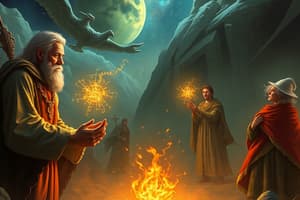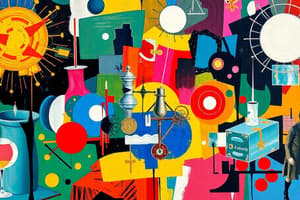Podcast
Questions and Answers
Which Enlightenment thinker is best known for advocating for empirical methods in scientific inquiry?
Which Enlightenment thinker is best known for advocating for empirical methods in scientific inquiry?
- Isaac Newton
- Thomas Hobbes
- Francis Bacon (correct)
- René Descartes
What contribution did Isaac Newton make that significantly changed scientific understanding in the 1600s?
What contribution did Isaac Newton make that significantly changed scientific understanding in the 1600s?
- Theory of celestial mechanics
- Theory of relativity
- Laws of motion and universal gravitation (correct)
- Heliocentric model of the Universe
Which factor from the American Revolution greatly influenced revolutionary movements in other nations?
Which factor from the American Revolution greatly influenced revolutionary movements in other nations?
- The establishment of an aristocratic government
- The military alliances formed with France
- The emphasis on rights of individuals (correct)
- The insistence on constitutional monarchy
Which concept is central to the Declaration of the Rights of Man and the Citizen?
Which concept is central to the Declaration of the Rights of Man and the Citizen?
Whose political philosophy introduced the separation of powers as a critical structure for governance?
Whose political philosophy introduced the separation of powers as a critical structure for governance?
Which of the following best describes John Locke's views on natural rights?
Which of the following best describes John Locke's views on natural rights?
What was a significant outcome of the Radical Stage of the French Revolution?
What was a significant outcome of the Radical Stage of the French Revolution?
What key idea did Montesquieu’s writings contribute to modern political thought?
What key idea did Montesquieu’s writings contribute to modern political thought?
What concept is most closely associated with the ideas presented by Jean Jacques Rousseau regarding freedom and governance?
What concept is most closely associated with the ideas presented by Jean Jacques Rousseau regarding freedom and governance?
Which of Galileo’s contributions to the Scientific Revolution is most significant for supporting the heliocentric model?
Which of Galileo’s contributions to the Scientific Revolution is most significant for supporting the heliocentric model?
Which document would be best to compare with the Declaration of the Rights of Man in terms of the Enlightenment ideals about rights?
Which document would be best to compare with the Declaration of the Rights of Man in terms of the Enlightenment ideals about rights?
What was the primary influence of the American Revolution on the movements for independence in South America?
What was the primary influence of the American Revolution on the movements for independence in South America?
Which statement embodies the political philosophy that the king is accountable only to God?
Which statement embodies the political philosophy that the king is accountable only to God?
What principle is highlighted in the statement, 'Men are born and remain free and equal in rights'?
What principle is highlighted in the statement, 'Men are born and remain free and equal in rights'?
Which Enlightenment idea influenced both the Declaration of Independence and the Declaration of the Rights of Man?
Which Enlightenment idea influenced both the Declaration of Independence and the Declaration of the Rights of Man?
In what way did Galileo's contributions to science challenge existing political and religious views at the time?
In what way did Galileo's contributions to science challenge existing political and religious views at the time?
Which of the following ideas represents the foundation for legitimate governments according to Enlightenment thinkers?
Which of the following ideas represents the foundation for legitimate governments according to Enlightenment thinkers?
Which event is most closely associated with John Locke's assertion that 'where there is no law, there is no freedom'?
Which event is most closely associated with John Locke's assertion that 'where there is no law, there is no freedom'?
What was a significant outcome of the American and French revolutions regarding citizen involvement in governance?
What was a significant outcome of the American and French revolutions regarding citizen involvement in governance?
What political system did King Louis XIV exemplify with his declaration 'I am the state'?
What political system did King Louis XIV exemplify with his declaration 'I am the state'?
In the Late Middle Ages, which factor contributed to the emergence of a middle class in France?
In the Late Middle Ages, which factor contributed to the emergence of a middle class in France?
How did the French invasion of Spain under Napoleon impact the Spanish colonies in the Americas?
How did the French invasion of Spain under Napoleon impact the Spanish colonies in the Americas?
What ideological influence did the Enlightenment thinkers have on the later declaration of rights?
What ideological influence did the Enlightenment thinkers have on the later declaration of rights?
What was a prevalent philosophy regarding governance in the period of the Scientific Revolution?
What was a prevalent philosophy regarding governance in the period of the Scientific Revolution?
Study Notes
Scientific Revolution
- Kepler explained that planets travel in orbits around the Sun.
- Galileo's telescope allowed him to collect evidence for the heliocentric model of the universe.
- Isaac Newton proposed laws of gravity that helped launch the Scientific Revolution.
- Francis Bacon used the scientific method.
- The scientific method involves experimenting to test a hypothesis.
- Nicolaus Copernicus developed the heliocentric model of the universe.
- Galileo invented the thermometer.
Enlightenment
- John Locke believed the primary purpose of government was to protect the natural rights of individuals.
- John Locke's ideas influenced the Declaration of Independence.
- Baron de Montesquieu developed the concept of separation of powers.
- Jean Jacques Rousseau thought humans are born free but live with constraints.
- Rousseau's ideas influenced the Declaration of the Rights of Man and of the Citizen.
French Revolution
- The French Revolution established that legitimate governments receive power from citizens.
- The Storming of the Bastille was a defining moment of the Radical Stage of the French Revolution.
- The Reign of Terror was a period of violence and executions by the revolutionary government.
- Napoleon Bonaparte brought stability and order to revolutionary France.
American Revolution
- The American Revolution was a major influence on South American independence movements.
- The American Revolution influenced other nations in their fight for equality.
Other Important Information
- Declaration of the Rights of Man and of the Citizen - law should be the same for all and protect rights.
- Divine right of kings - kings answer only to God.
- The Mayflower Compact and the English Bill of Rights were inspired by the concept of natural rights.
- The Magna Carta was inspired by the concept of citizens' rights.
- The U.N. Universal Declaration of Human Rights stated that the will of the people should be the basis of government authority.
- John Locke believed there was no freedom without law.
- King Louis XIV believed in divine right, declared "I am the state," and canceled the Edict of Nantes. He supported absolute monarchy.
- The French invasion of Spain under Napoleon led to several colonies rebelling against Spain.
Key Terms
- Heliocentric model - the model of the universe with the sun at the center.
- Geocentric model - the model of the universe with the Earth at the center.
- Natural rights - rights that cannot be taken away, such as life, liberty, and property.
- Separation of powers - dividing government power between different branches, such as legislative, executive, and judicial.
- Social contract - an agreement between people and their government.
- Divine right of kings - the belief that kings receive their authority directly from God.
- Absolute monarchy - a form of government where a king or queen has unlimited power.
- Democracy - a form of government where every citizen has the right to vote or participate in government.
- Theocracy - a form of government where religious leaders rule.
- Edict of Nantes - a law passed by King Henry IV in 1598 that granted religious freedom to Protestants in France.
- The Great Fear - a period of panic and violence in 1789 during the French Revolution.
- The Tennis Court Oath - a promise made by the Third Estate in 1789 during the French Revolution to create a new constitution.
Studying That Suits You
Use AI to generate personalized quizzes and flashcards to suit your learning preferences.
Related Documents
Description
Explore the pivotal ideas and figures from the Scientific Revolution and the Enlightenment. This quiz covers key contributors like Kepler, Galileo, Newton, and Locke, as well as essential concepts such as the scientific method and the separation of powers. Test your knowledge on how these movements shaped modern thought!




